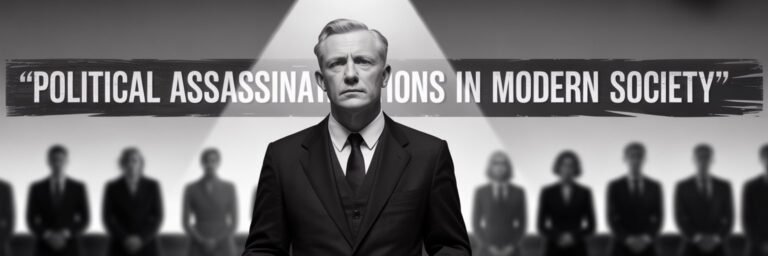INTRODUCTION
Political assassinations, despite their morally reprehensible nature, have significantly impacted global history, shaping nations and changing the course of human events. Within these shadowy facets of history are the controversial moments that have transcended temporal boundaries to fuel speculation and debate, forever engrained in our collective consciousness. This article explores a series of such moments, trusts into uncertainties, intricates through theories, and lands on the legacies they cast in trimming the trajectory of political evolution.
HISTORICAL BACKGROUND
Before plunging into the depths of controversy, it is paramount to gauge the significance of political assassination in historical context. Assassination, the planned murder of a prominent figure, especially a political leader, for ideological or political reasons, has been a part of human society since antiquity. Circa 44 BC, Roman Dictator Julius Caesar fell in the Senate at the hands of his sworn friends and political allies. This bloody act shook the Roman Republic and laid the groundwork for the eventual establishment of the Roman Empire.
Fast-forwarding to modern times, political assassinations have remained relevant. The world watched in shock as Abraham Lincoln, Archduke Franz Ferdinand, Louis Mountbatten, and John F. Kennedy were fatally struck down – the resultant shockwaves of which led to societal, geopolitical, and even global changes, such heartbreakingly highlighted being put the volatile nature of these events.
THEORIES AND INTERPRETATIONS
Behind each of these high-profile assassinations lies a labyrinth of theories often leaning on conspiratorial lines. Take the case of President John F. Kennedy’s assassination in 1963. The official Warren Commission Report identifies Lee Harvey Oswald as the lone dominator of this tragic event. Multiple bullets, viewed from varying angles, however, have produced a spectrum of interpretations, pointing at varied forces – the mob, the U.S. military-industrial complex, or even the CIA – as possible orchestrators.
Similarly, the circumstances around the death of Martin Luther King Jr., the face of the American civil rights movement, are shrouded with conflicting narratives. The lone gunman theory once again comes under scrutiny, with some proponents casting suspicious glances toward the FBI and the Memphis Police Department, despite James Earl Ray’s confession to the crime.
MYSTERIES AND CONTROVERSIES
The inherent mystery in each of these assassinations is the bedrock of enduring controversies. Take Louis Mountbatten’s death, for instance. The Provisional Irish Republican Army (IRA) claimed responsibility, yet the question of whether the organization acted alone persists.
The assassination of Pakistan’s first female Prime Minister, Benazir Bhutto in 2007, sparks similar intrigue. Her death rattled Pakistan and sent shockwaves through the global political landscape. Following a suicide bomb attack after a political rally, the Pakistani Government initially blamed the Taliban. However, Bhutto’s party disputed this, claiming the government itself orchestrated the assassination.
SYMBOLISM AND CULTURAL SIGNIFICANCE
Political assassinations carry potent symbolic values, which indelibly stamp their mark on our collective cultural psyche. They represent a clash of ideologies, the struggle for power, and a defiant — albeit violent — opposition to status quo. The assassination of Archduke Franz Ferdinand in 1914 was bolder than a mere killing; it was an audacious strike against the Austro-Hungarian Empire that ultimately propelled the world into World War I.
In American culture, the assassination of Abraham Lincoln has taken on a deeply symbolic meaning. Not only did it end the life of a President who helped abolish slavery and steer the country through civil war, but the event also stood as a stark symbol of the bitter divisions that remained.
MODERN INVESTIGATIONS
In the present day, technology and continued interest have given rise to new investigations into these past events. Controversial filmmaker Oliver Stone’s 1991 movie “JFK” challenged the official version of Kennedy’s assassination, shining a light on several conspiracy theories and prompting reopening of files on JFK’s murder case.
Advanced forensic science and persistent researchers have also reopened the investigation into Martin Luther King Jr.’s death. In the late 1990s, a civil trial even concluded with the jury agreeing that the assassination was the result of a conspiracy, one that potentially involved government agencies.
LEGACY AND CONCLUSION
Political assassinations leave a multifaceted legacy. While creating martyrs who live on in collective memory, these violent acts also provide a sobering look at the depth of division and animosity capable in society. Yet, even in darkness, they inspire a quest for truth that drives historians, investigators, and the public to continue to explore, debate, and learn from our past.
The enduring fascination with these events, their controversial moments, and the influence they wield even after centuries, demonstrates that political assassinations are not mere footnotes in the annals of history. Rather, they are significant chapters that challenge us to critically examine our collective past. Incidental as it may seem, who pulls the trigger can sometimes be secondary to examining why the trigger was pulled in the first place, and understanding the consequences that ripple out far beyond the bullet’s immediate destination. This understanding is essential – because history is not just about what happened; it’s also about how we perceive, interpret, and learn from those happenings.






